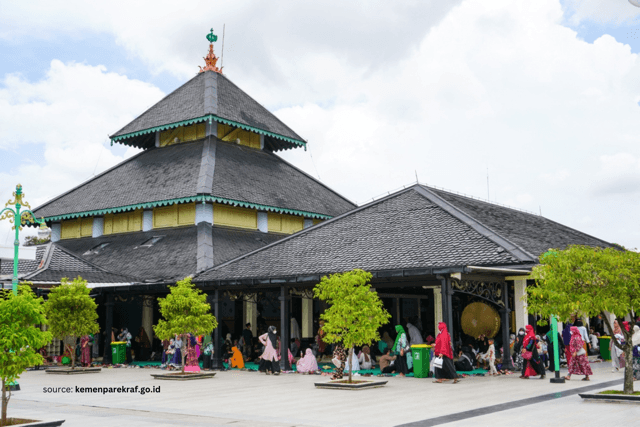Travel
Wali Songo Pilgrimage: Religious Trip Ahead of Ramadan
25 March 2024
Share
Ramadhan datang alam pun riang (Ramadan has come, the world rejoices)
Menyambut bulan yang berkah (As it welcomes the blessed month)
Umat berdendang kumandang azan (People around the world recite the call to prayer)
Pertanda hati yang senang (As their hearts filled with joy)
This excerpt from the 2010 song “Ramadhan Datang” (Ramadan Has Come), popularized by Tompi, briefly describes the Muslims’ enthusiasm ahead of Ramadan. Such enthusiasm is evident among Indonesian people, who welcome Ramadan with excitement every time.
Our culturally diverse people always welcome Ramadan in various ways, for example the Meugang tradition in Aceh and the Bakar Batu tradition in Papua. These traditions are deeply rooted among people in the respective regions.
Aside from the cultural rituals, Indonesian people also go on a pilgrimage to visit the ulemas (preachers) graves ahead of Ramadan. One is the visit to Wali Songo’s graves on the island of Java.
Wali Songo is the nickname for the nine wali (saints) who, in ancient times, consistently spread Islam’s teachings across Java. As Ramadan approaches, Wali Songo’s graves, which are located across West Java and East Java, are filled with numerous pilgrims.
The Wali Songo pilgrimage trip is not only a commemorative visit but also a moment to foster closer relationships with one another since it’s usually carried out in groups.
Wali Songo’s Graves in Java
Sunan Gresik
Sunan Gresik, whose real name is Maulana Malik Ibrahim or Malik Maghribi, was the first wali in Java. His father, Barakat Zainul Alam, was a great ulema from Maghreb or Morocco in the present day. He received the title Malik Maghribi based on his father’s hometown.
Sunan Gresik passed away on 12 Rabi’ul Awal 822 (1419) and was buried in Gresik. His grave is in Gapura Village, Sukolilo, Gresik, near the Gresik town square and the Jami’ Gresik Mosque.
Sunan Ampel
Sunan Ampel was the son of Sunan Gresik and has the full name of Raden Mohammad Ali Rahmatullah or Raden Rahmat. One of his notable teachings was “Moh Limo,” which calls Muslims to abstain from five sinful acts.
Sunan Ampel’s grave is in Ampel Village, Petukangan I Road, Ampel, Semampir, Surabaya, East Java.
Sunan Giri
Sunan Giri was the son of Maulana Ishaq and Dewi Sekardadu. He was born in 1442 with Joko Samudro as his real name and was Sunan Ampel’s disciple. Sunan Giri is famous for his da’wah, which uses children’s game songs.
Sunan Giri’s grave is in Sunan Giri Road, Giri Gajah Hamlet, Giri Village, Kebomas Sub-district, Gresik, East Java.
Sunan Bonang
Sunan Bonang, whose real name is Raden Makdum Ibrahim, was born in Surabaya in 1465. He was the fourth son of Raden Rahmat or Sunan Ampel and the brother of Sunan Drajat.
He was famous for using the gamelan and the song “Tombo Ati.”His grave is in Kutorejo, Tuban, East Java.
Sunan Drajat
Sunan Drajat’s grave is in Drajat Village, Paciran, Lamongan, East Java. His real name is Raden Syarifudin or Raden Qasim. Sunan Ampel is his father, and Sunan Bonang is his younger brother. He uses the arts of suluk (Javanese anthem) and tembang pangkur (Javanese poetry) in his da’wah.
Sunan Muria
Sunan Muria, or Raden Umar Said, was the youngest wali in Central Java. He often uses the art of macapat (Javanese poetry) called Sinom and Kinanti in his Da’wah. His grave is in Muria Hill, Colo Village, Dawe, Kudus, Central Java.
Sunan Kalijaga
Sunan Kalijaga, or Raden Said, was the son of Raden Ahmad and had the title of Tumenggung Wilwatikta. He often uses artistic approaches, such as wayang, in his Da’wah.
His grave is in Kadilangu, Demak, Central Java, 2 kilometers from Demak Grand Mosque.
Sunan Kudus
Sunan Kudus or Ja’far Shadiq was the son of Sunan Ngudung. He built the Menara Kudus Mosque in 956 on his mission to spread Islam across Central Java. His grave is located behind the mosque in Pejaten, Kauman, Kudus.
Sunan Gunung Jati
Sunan Gunung Jati or Syarif Hidyatullah was the son of King Abdullah. He is the only member of Wali Songo, and his grave is in West Java.
Sunan Gunung Jati did his da’wah from Cirebon to Banten throughout his life. His grave is in Alun-Alun Road no. 53, Cirebon, West Java.
Those are the locations of the Wali Songo’s graves, which are spread across Java. Since Ramadan is only a few days away, you can plan to take your family or relatives there.
You can use the rental tour bus service offered by TRAC as a choice for your pilgrimage journey. With over 37 years of experience, TRAC’s tour buses offer comfort and meet the Ministry of Transportation’s safety standards.
You can use TRAC’s rental tour bus service with ease by visiting the reservation page on the website or the TRACtoGo app. You can download it on Play Store or App Store and enjoy TRAC’s various benefits.
For the latest news from TRAC, be sure to follow @trac_astra on Instagram, TRAC-Astra Rent a Car on Facebook, and @TRACastra on Twitter.
Stay on track with TRAC!
Share
Latest and Most Popular Articles
News
TRAC Car Rental: Quality That Drives Every Journey
16 September 2025
Travel
Nusa Penida Travel Guide: From Kelingking Beach to Manta Point
15 September 2025
Travel
5 Hidden Gems in Bali That Deserve a Spot on Your Travel List
12 September 2025
Tips
A Guide to TRAC’s Tourist Buses and How to Choose the Right One
11 September 2025
Travel
A Taste of the World in Yogyakarta Without Breaking the Bank
10 September 2025
Newsletter Subscription Free

![[BANNER THUMBNAIL] TRAC BUS PROMO IMLEK.jpg](https://omnispace.blob.core.windows.net/strapi-prod/2024-01-05/BANNER_THUMBNAIL_TRAC_BUS_PROMO_IMLEK_f03b9fac8c.jpg)










